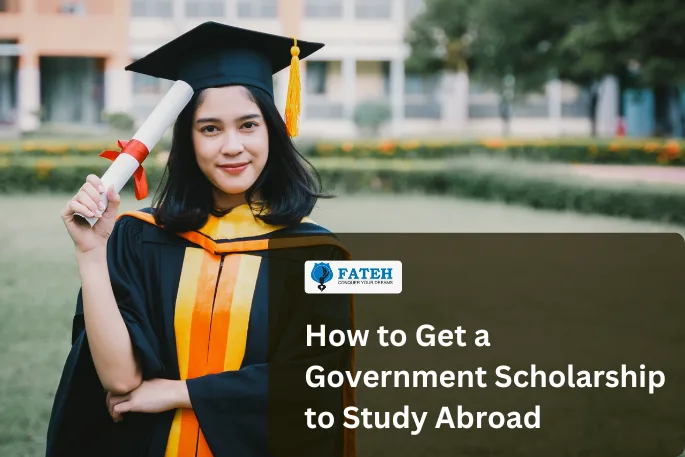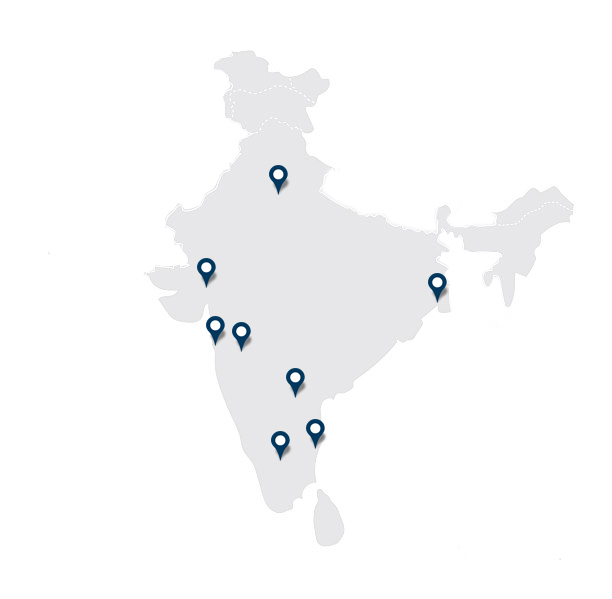Introduction
Studying abroad is a dream for countless Indian students, but the financial hurdles can often feel insurmountable. That’s where government scholarships step in, transforming aspirations into attainable plans. These scholarships not only bridge the gap between ambition and affordability but also open doors to world-class education, diverse cultures and unrivalled global exposure.
For students from all backgrounds—especially those from economically weaker sections and marginalised communities—government support is more than just financial aid; it’s a catalyst for empowerment and upward mobility. Understanding how to get a government scholarship to study abroad is the first step towards making international education a reality, regardless of your family’s financial situation. With schemes that cover tuition, living expenses and travel costs, government scholarships ensure that talent and determination, not wealth, define your academic journey.
As you consider your options, it’s worth understanding about the variety of government scholarships available and who they are designed for. Each programme has its own set of criteria and benefits, making it essential to find the right fit for your background and ambitions.
Understanding Government Scholarships for Study Abroad
Government scholarships for Indian students looking to study abroad come in various forms, each designed to support different backgrounds and academic ambitions. Central government schemes like the National Overseas Scholarship (NOS) prioritise students from marginalised communities, covering tuition, living costs, airfare and even visa expenses for master’s and PhD programmes. State-level initiatives may offer similar support, often with region-specific eligibility or focus areas. Eligibility criteria commonly include Indian citizenship, a minimum academic score (often 55–60% in graduation), an upper age limit (typically 35 years) and proof of admission to a recognised foreign university. Some scholarships also consider family income, caste, or disability status, ensuring inclusivity for a wide range of students.
Comprehending how to get a government scholarship to study abroad means recognising that these programmes are not just about financial aid—they open doors to global networks, cultural exchange and career-defining opportunities. The benefits extend beyond tuition coverage, often including mentorship, travel allowances and support for research or innovation. Knowing the landscape helps students identify which options best match their profile.
With a clearer picture of what’s available, the next step is to explore the specific scholarships and what sets each apart. This deeper look will help you decide which path aligns with your goals as you learn how to get a government scholarship to study abroad.
Top Indian Government Scholarships for 2025
Indian students aiming to study abroad in 2025 have access to an impressive range of government scholarships, each tailored to different academic levels, backgrounds and fields of study. These scholarships not only address financial barriers but also prioritise inclusivity and excellence, making world-class education achievable for a diverse student population.
Major Central Government Scholarships
-
National Overseas Scholarship (NOS)
- Managed by: Ministry of Social Justice and Empowerment
- Target Group: SC, ST, Denotified, Nomadic & Semi-Nomadic Tribes, Landless Agricultural Labourers, Traditional Artisans
- Level: Master’s and PhD
- Benefits: Full tuition, living expenses, airfare, visa costs
- Eligibility: Indian citizenship, minimum 60% in the qualifying exam, family income below ₹8 lakh, age below 35, admission to a recognised foreign university
- Application Deadline: Usually April–May
-
Fulbright-Nehru Master’s Fellowship
- Managed by: USIEF (United States-India Educational Foundation)
- Target Group: Indian citizens pursuing a master’s in the US
- Level: Master’s
- Benefits: Up to ₹40 lakh, full tuition, monthly stipend, round-trip airfare
- Eligibility: Minimum 55% in bachelor’s, 3 years relevant work experience, Indian citizenship
- Application Deadline: Mid-May
-
Agatha Harrison Memorial Fellowship
- Managed by: Ministry of External Affairs
- Target Group: Indian researchers at Oxford University
- Level: Research (post-PhD)
- Benefits: £29,347 stipend, economy airfare, research facilities
- Eligibility: Age 30–40, PhD, minimum 60% in master’s, 3+ years teaching experience
- Application Deadline: January 1
-
Dr. Ambedkar Interest Subsidy
- Managed by: Ministry of Social Justice and Empowerment
- Target Group: OBC and EBC students
- Level: Education loan support
- Benefits: Interest coverage during moratorium period, up to ₹20 lakh
- Eligibility: Family income below ₹8 lakh, education loan from scheduled bank
- Application Deadline: Quarterly evaluation
Notable State and Private Trust Scholarships
-
JN Tata Endowment
- Managed by: Tata Trusts
- Target Group: Indian citizens for postgraduate studies abroad
- Level: Master’s, PhD
- Benefits: Loan up to ₹10 lakh, travel grant of ₹50,000, possible gift scholarship
- Eligibility: Under 45, minimum 60% in graduation
- Application Deadline: March 23
-
Inlaks Shivdasani Foundation Scholarship
- Managed by: Inlaks Shivdasani Foundation
- Target Group: Indian nationals under 30 for liberal arts, fine arts, social sciences, law
- Level: Master’s, MFA, PhD
- Benefits: Up to ₹84.38 lakh, tuition, living expenses, healthcare
- Eligibility: Born after January 1, 1993, 65–70% academic grade, offer from a prestigious university
- Application Deadline: March/April
-
Lady Meherbai D Tata Education Trust Scholarship
- Managed by: Tata Trusts
- Target Group: Women graduates
- Level: Master’s
- Benefits: ₹3–6 lakh, partial tuition support
- Eligibility: Strong academic record, 2 years of work experience, admission secured
- Application Deadline: April 28
| Scholarship Name | Maximum Funding | Target Group/Field | Key Eligibility Criteria | Application Deadline | Notable Benefits |
|---|---|---|---|---|---|
| National Overseas Scholarship | Up to ₹12.81L/year | SC/ST/DNT/SNT, Landless, Artisans | 60% in qualifying exam, <₹8L income, <35 yrs | Mid-February (45 days) | Tuition, living, travel and visa |
| Fulbright-Nehru Master’s | Up to ₹40L | Master’s in US | 55% in bachelor’s, 3 yrs work exp, Indian | Mid-May | Tuition, stipend, airfare |
| Agatha Harrison Fellowship | £29,347 | Oxford researchers | 30–40 yrs, PhD, 60% in master’s, teaching experience | January 1 | Stipend, airfare, research |
| Dr. Ambedkar Interest Subsidy | Up to ₹ 20 L | OBC/EBC | <₹8L income, bank loan | Quarterly | Interest coverage |
| JN Tata Endowment | Up to ₹ 10 L | Postgraduate studies | <45 yrs, 60% in graduation, Indian | March 23 | Loan, travel grant, gift |
| Inlaks Shivdasani Foundation | Up to ₹ 84.38 L | Liberal arts, fine arts, law | <30 yrs, 65–70% grade, offer | March/April | Tuition, living, healthcare |
| Lady Meherbai D Tata Scholarship | ₹3–6L | Women graduates | Strong academics, 2 yrs work exp, offer | April 28 | Partial tuition support |
Additional Insights and Lesser-Known Opportunities
- Fulbright-Kalam Climate Fellowship: For PhD students in environmental research, offering monthly stipend, health coverage and travel support.
- Commonwealth Scholarship: For postgraduate studies in the UK, full tuition, monthly allowance and airfare—open to Indian citizens who are Commonwealth residents.
- Erasmus Mundus: For studies across Europe, offering up to €33,600, a monthly stipend, tuition waiver and health insurance—requires English proficiency and no previous Erasmus grant.
- GREAT Scholarships: For UK postgraduate studies, minimum £10,000 tuition support, strong academics and English proficiency required.
- Goa EDC Scholarship: For Goan residents, up to ₹40,000/year, family income below ₹5 lakh, direct benefit transfer.
Why These Scholarships Matter
These scholarships are more than just financial support—they open doors to global education, research and professional networks. They are designed to ensure that talent and hard work, not financial background, determine a student’s academic journey. Understanding how to get a government scholarship to study abroad means recognising the unique features and requirements of each programme and matching them to your academic and personal profile.
With this detailed overview in hand, you are now better equipped to identify which scholarship aligns best with your goals. The next step is to navigate the application process for government scholarships, where preparation and attention to detail can make all the difference in how to get a government scholarship to study abroad.
Application Process for Government Scholarships
Step-by-Step Guide
-
Research and Shortlist
- Begin by identifying scholarships that match your academic background, financial need and study destination. Use official portals like the IDP India scholarship page for accurate, up-to-date information.
- Pay attention to deadlines, eligibility criteria and required documents for each programme. Some scholarships, such as those for marginalised communities, have specific requirements you must meet.
-
Prepare Your Documents
- Gather essential paperwork: academic transcripts, proof of identity, income certificates, recommendation letters, and a statement of purpose. For some scholarships, you may also need a medical certificate or police clearance.
- Ensure that all documents are translated (if necessary) and notarised. Missing or incomplete documents are a common reason for rejection.
-
Application Submission
- Most government scholarships now require online applications. Create an account on the relevant portal (like the National Scholarship Portal or A2A for ICCR scholarships) and fill in the details carefully.
- Upload scanned copies of your documents as specified. Double-check each entry before submitting—errors can delay or disqualify your application.
-
Follow Up and Track Your Application
- After submission, keep track of your application status through the portal or via email updates.
- Be proactive: if you notice missing information or delays, contact the scholarship office or your local Indian mission for clarification.
-
Interview and Selection
- Some scholarships include an interview or additional assessments. Prepare thoroughly by reviewing your application and practising common interview questions.
- If selected, you’ll receive an offer letter. Respond promptly to confirm your acceptance.
Tips for a Successful Application
- Start Early: Give yourself plenty of time to research, prepare and review your application.
- Tailor Your Statement of Purpose: Highlight your unique story, academic goals and why you deserve the scholarship. Avoid generic statements.
- Seek Feedback: Ask mentors or teachers to review your application materials.
- Stay Organised: Keep a checklist of deadlines and required documents to avoid last-minute stress.
- Be Honest: Never falsify information—integrity is crucial.
Securing a government scholarship to study abroad takes both preparation and persistence. With the right planning and attention to detail, you can greatly improve your odds of success.
Conclusion
As you reach the end of this guide, remember that the opportunity to study abroad with a government scholarship is not just a dream—it’s a real, attainable goal for determined students. Every year, countless bright minds from across India take that first step, armed with information and a clear plan, and find themselves on a path that transforms their academic and professional futures. Whether you’re just starting to consider your options, or you’re ready to submit your application, the time to act is now.
Don’t let uncertainty hold you back. Take what you’ve learned here, tailor it to your unique story and start building your scholarship journey with confidence. If you need personalised guidance, expert advice, or a helping hand through the maze of applications and deadlines, Fateh Education is here to support you every step of the way. Reach out to our team today—let’s turn your study abroad aspirations into reality together.
FAQs on Government Scholarships for Study Abroad
Yes, the Indian government offers several scholarships specifically to support students who wish to pursue higher education abroad. Notable schemes include the National Overseas Scholarship, Fulbright-Nehru Fellowships, and various state-level initiatives. These programmes are designed to empower students from diverse backgrounds to access world-class education overseas.
To secure a fully funded scholarship, you should identify government scholarships that cover all major costs—such as tuition, living expenses, airfare and sometimes even health insurance. Meeting eligibility criteria, preparing strong application materials and applying early are crucial steps. The National Overseas Scholarship and Fulbright-Nehru Master’s Fellowship are examples of programmes that offer comprehensive financial support for eligible students.
Yes, alongside government scholarships, there are private scholarships available for Indian students. These include awards from foundations like the JN Tata Endowment, Inlaks Shivdasani Foundation and Lady Meherbai D Tata Education Trust. Private scholarships often have their own eligibility criteria and application processes.
Indian government scholarships typically cover tuition fees, living expenses, travel costs (including airfare), visa fees and sometimes health insurance. The exact coverage varies depending on the specific scholarship programme, so it’s important to review the details of each scheme before applying.


